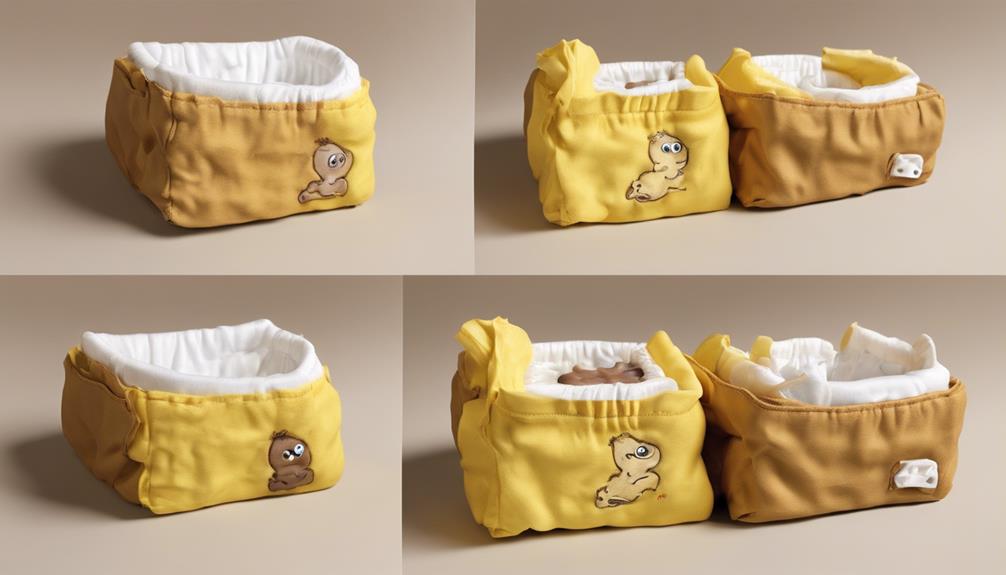As parents, we often find ourselves steering through the murky waters of baby care, much like a sailor steering through stormy seas.
One particular aspect that can leave us pondering is how often a newborn should poop every day. The frequency of diaper changes can be a telltale sign of a baby's health, but how much is too much or too little?
Let's uncover the mystery behind newborn poop patterns and what they may signify for your little one's well-being.
Key Takeaways
- Breastfed babies may poop after each feeding session, averaging 2-5 times a day.
- Formula-fed babies usually have 1-4 bowel movements daily.
- Passing meconium in the first 24-48 hours is normal for newborns.
- Regular diaper changes help monitor stool patterns for early detection of any concerns.
Frequency of Newborn Bowel Movements
When caring for a newborn, understanding the frequency of their bowel movements is essential for monitoring their health and development. Breastfed babies tend to have more frequent bowel movements, sometimes after each feeding session, which is entirely normal.
On the other hand, formula-fed babies may poop less often, averaging around 1-4 times a day. It's common for newborns to pass meconium, a dark and sticky stool, in the initial 24-48 hours after birth. This shift to regular bowel movements is a positive sign of the baby's digestive system functioning well.
Regular diaper changes are critical for keeping track of your newborn's stool patterns. If your newborn hasn't had a bowel movement for more than a week, it's advisable to consult the pediatrician to rule out any underlying issues. Monitoring your newborn's poop frequency is an integral part of ensuring their well-being and growth.
Factors Affecting Newborn Poop Frequency

Understanding the various factors that influence a newborn's poop frequency is important for parents to monitor their baby's health effectively. When it comes to newborn digestion, several elements play a role in determining how often a baby poops. Here are some key factors to consider:
- Breastfed infants: Breastfed newborns tend to have more frequent bowel movements, sometimes after each feeding session.
- Formula-fed: Formula-fed babies typically have fewer bowel movements compared to breastfed babies, averaging around 1-4 times a day.
- Individual digestion: Each baby has a unique digestive system, which can affect how often they need to pass stool.
- Passing meconium: The first bowel movement, called meconium, is a significant event within the first 24 hours of birth, followed by regular bowel movements.
- Healthcare provider: Consulting a healthcare provider is advisable if a newborn goes more than 1-2 days without having a bowel movement, to consider the baby's well-being.
Normal Newborn Poop Patterns
Considering the factors that influence a newborn's poop frequency, understanding the normal patterns of bowel movements in newborns is important.
Newborn poop patterns vary depending on whether the baby is breastfed or formula-fed. Breastfed babies typically have more frequent bowel movements, averaging around 2-5 times a day in the first few weeks. These stools are often small and may occur after each feeding.
On the other hand, formula-fed babies tend to have fewer but larger bowel movements, usually ranging from 1-4 times a day.
Changes in newborn poop frequency can occur, but paying attention to the consistency and color of the stool is vital, as they serve as important health indicators in infants.
Regardless of the feeding method, both breastfed and formula-fed babies can have normal bowel movements, and variations in poop frequency are generally considered normal in the early stages of a newborn's life.
When to Seek Medical Advice

Monitoring your newborn's bowel movements for any unusual changes is essential to identifying potential health issues early on. If you notice anything concerning, it's important to seek medical advice promptly. Here are some key points to take into account:
- Constipation Concerns: Contact the pediatrician if your newborn hasn't pooped in over a week, as it could indicate constipation or other health issues.
- Changes in Poop: If you observe changes in poop color, consistency, or frequency that seem unusual, consulting a healthcare provider is vital.
- Discomfort and Distress: Seek medical advice if your newborn is showing signs of discomfort or distress during bowel movements.
- Prompt Action: Address any concerns related to newborn poop promptly with the pediatrician to assure the baby's health and well-being.
- Regular Monitoring: Regular communication with the pediatrician helps in monitoring your newborn's poop patterns and enables early intervention if needed.
Monitoring Newborn Bowel Movements
Regularly observing your newborn's bowel movements is essential for gauging their digestive health and overall well-being. Newborns typically poop 2-5 times a day in the first few weeks of life. Breastfed babies may have more frequent bowel movements compared to formula-fed babies. It's important for newborns to pass meconium within the first 24 hours after birth. Monitoring your baby's bowel movements can provide valuable insights into their health and feeding adequacy.
If your newborn hasn't pooped for more than a week, it's vital to contact the pediatrician. Changes in poop frequency, consistency, or color can also indicate potential issues that need attention. Keeping a poop diary can help track patterns and provide useful information for discussions with the pediatrician.
Pay attention to any signs of distress, such as hard stools, blood in the poop, or excessive straining during bowel movements. By staying vigilant and seeking guidance when needed, you can make sure your baby's digestive system is functioning well and support their overall health.
Frequently Asked Questions
How Many Poops Should a Newborn Take a Day?
We monitor newborn poop frequency to guarantee digestion and health. Breastfed babies may poop 1-8 times daily, while formula-fed ones typically go 1-4 times. Any significant changes warrant a pediatrician's advice. Regular checks are essential.
How Long Can Newborns Go Without Pooping?
We must remember that newborns can vary in their bowel habits. It is common for babies to go a few days without pooping, especially breastfed ones. Always consult a pediatrician if concerned.
How Often Should a Newborn Have a Poopy Diaper?
As new parents, we monitor our newborn's poopy diapers closely. It's important to know what's normal for their digestive health. On average, breastfed babies may poop 3-4 times daily, while formula-fed babies might poop 1-2 times. Any significant changes warrant attention.
How Do I Know if My Newborn Is Constipated?
When determining if a newborn is constipated, observe for signs like firm stools, discomfort during bowel movements, or infrequent pooping. Check with a pediatrician if concerned. Breastfed babies can sometimes go days without pooping, which is normal.
Conclusion
To sum up, keeping track of your newborn's poop frequency is crucial for monitoring their health. Just like a compass guides us on our journey, observing your baby's bowel movements can guide you in understanding their well-being.
Remember, any significant changes in poop patterns or colors should prompt a discussion with your pediatrician to make sure your little one is happy and healthy.
Stay vigilant and trust your instincts when it comes to your baby's poop!









